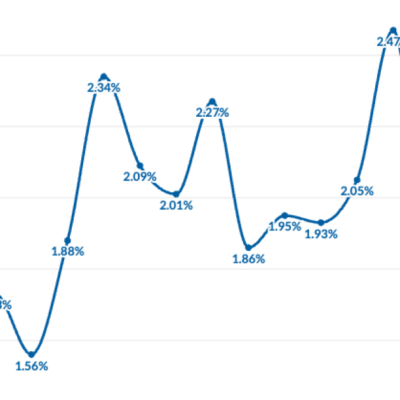Mortgage rates showed little movement Thursday as markets awaited the Federal Reserve’s rate policy decision next week.
The average rate on 30-year fixed home loans registered 6.74% for the week ending July 24, down just barely from 6.75% last week, according to Freddie Mac. Rates averaged 6.78% during the same period in 2024.
“This week, the 30-year fixed-rate mortgage essentially remained flat,” says Sam Khater, Freddie Mac’s chief economist. “Overall, the backdrop for the housing market is positive as the economy continues to perform well with solid employment and income growth.”

Despite mounting pressure from President Donald Trump‘s administration to cut rates, the Fed is widely expected to hold rates steady when central bank policymakers meet next Wednesday.
After cutting a full percentage point last fall, the Fed has left its benchmark rate unchanged since December at the current range of 4.25% to 4.5%.
Mortgage rates have hovered in a narrow range between 6.6% and just above 7% over the same period, adding to affordability woes for homebuyers and keeping home sales near 30-year lows.
Unfortunately for homebuyers, the latest reports on inflation and the labor market have provided scant support for a Fed rate cut, showing inflation heating up in June alongside strong job creation.
Nevertheless, Trump and his allies have heaped furious scorn on Fed Chair Jerome Powell for holding rates steady, with Trump-appointed Freddie Mac Chair Bill Pulte demanding a congressional investigation into Powell.
Meanwhile, the housing market remains stuck in summer doldrums following an exceptionally weak spring housing season, with sales of both new and existing homes coming in sluggish for June.
“High mortgage rates and elevated home prices have kept home sales near yearly lows—a trend that’s perhaps unsurprising given that, in nearly all major U.S. metros, renting a starter home remains the more budget-friendly option,” says Realtor.com® economist Jiayi Xu.
“While the long-term financial benefits of homeownership are still well-recognized, many prospective buyers are exercising patience in the face of persistent affordability challenges,” adds Xu. “Meanwhile, for renters, this environment offers flexibility and an opportunity to build savings.”
The Realtor.com economic research team forecasts that mortgage rates will remain elevated through the remainder of the year but gradually ease to around 6.4% by year-end.
How mortgage rates are calculated
Mortgage rates are determined by a delicate calculus that factors in the state of the economy and an individual’s financial health. They are most closely linked to the 10-year Treasury bond yield, which reflects broader market trends, like economic growth and inflation expectations. Lenders reference this benchmark before adding their own margin to cover operational costs, risks, and profit.
When the economy flashes warning signs of rising inflation, Treasury yields typically increase, prompting mortgage rates to go up. Conversely, signs of falling inflation or weakness in the labor market usually send Treasury yields lower, causing mortgage rates fall.
The mortgage rates you’re offered by a lender, however, go beyond these benchmarks and take some of your personal factors into account.
Your lender will closely scrutinize your financial health—including your credit score, loan amount, property type, size of down payment, and loan term—to determine your risk. Those with stronger financial profiles are deemed as lower risk and typically receive lower rates, while borrowers perceived as higher risk get higher rates.
How your credit score affects your mortgage
Your credit score plays a role when you apply for a mortgage. A credit score will determine whether you qualify for a mortgage and the interest rate you’ll receive. The higher the credit score, the lower the interest rate you’ll qualify for.
The credit score you need will vary depending on the type of loan. A score of 620 is a “fair” rating. However, people applying for a Federal Housing Administration loan might be able to get approved with a credit score of 500, which is considered a low score.
Homebuyers with credit scores of 740 or higher are typically considered to be in very good standing and can usually qualify for better rates.
Different types of mortgage loan programs have their own minimum credit score requirements. Some lenders have stricter criteria when evaluating whether to approve a loan. They want to make sure you’re able to pay back the loan.





